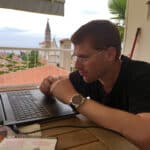
By Andrew Anžur Clement, PhD
So, you’ve decided that you want to do a PhD in something like Political Science or Sociology. Maybe you want to study in Europe. Maybe you’re just looking for a good funding opportunity and are willing to move abroad. Either way, you run across the European Union’s Marie Skłodowska Curie Fellowships. These are Europe’s answers to the US’s Fulbright program. The grants send Europeans abroad and bring third-country nationals to Europe to do their PhDs while paying them a salary to do it. You decide you want to apply for one of these fellowships and are thinking about what will give you the best chance of getting selected.
The short answer is simple: have a strong application. What does that mean exactly, you ask? Read on for some tips on how to make a competitive application for a PhD funding grant from the European Union.
First though, a bit more information about what MSC fellowships are. They cover funding on both the Doctoral and Postdoctoral levels. While you can submit your own custom program, this is mostly done at the post-doc level. At the PhD level, you’ll most likely be applying to a ‘PhD school,’ where multiple university departments have already proposed the program and its goals to the EU Commission and secured the funding to educate multiple PhDs within the proposed framework. You’ll graduate with degrees from one or more of the universities in the consortium of universities that put together the PhD school.
Sounds good? Now, here’s how to craft a strong application.
Find the program that’s the best fit for you
The EU’s website for the MSC fellowships is a bit confusing and, like most things EU, frankly a bit clunky. They fund research for everything from Political Science to Nuclear Physics to Literature. In my experience, the best way of weeding through it all and finding a program that’s a good fit with your educational and professional background is to already be ‘in the system.’ As mentioned above, the PhD program you choose is what you will be applying directly to.
In my case, I found out about my PhD school, now called GEM Diamond, through the Erasmus Mundus Master’s program that I was already on.
While being a part of one of these Erasmus Mundus Masters programs is by no means a requirement for applying, or a guarantee of getting selected for a PhD fellowship, being a part of the EU’s higher education system gave me a better idea of the ‘lay of the land.’ It also paid off when filling out my PhD application and asking for recommendations.
If this isn’t your situation, no worries, but choose your prospective program wisely.
Contact a professor who is involved with your chosen program and is willing to supervise your dissertation before you apply.
In my case, I cannot stress enough how important this was. There’s a reason why “Do you already have someone willing to supervise your proposed work?” was one of the questions on the application form. It makes it easier for the organisers of the PhD school if they don’t have to look for someone to supervise you after you are accepted.
Securing a potential supervisor beforehand is also perhaps the single best thing you can do to craft a strong research proposal that is likely to fit with the research goals of the PhD school and its constituent universities and thus be of interest to the people reviewing your application.
The professor who became my supervisor at the ULB in Belgium (my main home institution) was already active in the program. She really held my feet to the fire when writing the proposal for the application. Working on it was a good way to test the waters as to how we worked together. Who knows? Maybe she even put in a call to the GEM Central Executive Office to tell them to keep an eye out for my application.
Be specific about how the resources at your chosen institution will benefit your research.
On the Master’s level, you can request to study at specific schools that are members of the consortium, but you are more or less told where to go. You can and should talk a bit more about why your choices are what they are on the PhD application level.
Research the host universities, the departments that are involved with the program, and their sub-disciplines of specialty. Suggest why not only your proposed host institution – where your potential supervisor will be – is a good fit, but also where you would like to do your mobility or exchange year, which is mandatory for most dual degree programs. Even propose a supervisor for that second intuition, whether or not you have contacted them. Explain why this is crucial for your proposed research in the application questions/cover letter and in a broken-out section of your research proposal.
The reviewers want to see you have thought this out beyond ‘I want to do my mobility at this university because it’s the most prestigious one in the consortium.’ Remember, you are proposing a comprehensive research package.
Be aware that you are applying for a job.
As a PhD candidate in the EU, you still technically have student status. But you are also an EU-funded employee of your host university and will be paid over 100,000 Euros over the course of the next three years if selected. The tax regulations vary from country to country. In my case, I was able to ‘double-dip;’ in other words I was a gainful employee of ULB, with full health care and pension credits, but didn’t have to pay any taxes as I was also still a student. (Please note that if you are a US citizen, you will still have to file a tax return to the IRS, but will have the actual taxes waived.)
It’s a sweet deal. But you’re not really just a student anymore. The application examiners are assessing whether your job — the product of which is your dissertation and outreach work — will prepare you to have an impactful career afterward.
On that point, the EU has recently changed its higher education strategy to focus more on ‘impact,’ or what benefit your PhD fellowship, specifically, will have outside of the Ivory Tower of academia. This was not the case when I applied, but later iterations of the GEM PhD school – GEM Stones and GEM Diamond – had job interviews and mandatory internships with think tanks and corporate partners in addition to dissertation work. The alumni of the program have recently been asked to help in the selection process for GEM Diamond and assess whether a new candidate will be able to handle the rigor of the research work and outreach programs.
Have former professors who are ready to sing your praises.
This is perhaps related to point one: the benefits of being ‘in the system’. While on my Masters, I developed good working relationships with two of my professors at the University of Wrocław in Poland. They were happy to hear about my academic plans and jumped at the chance to write glowing letters of recommendation praising my work ethic, language ability, and intellectual rigor within the context of another EU higher education program.
Perhaps one final point: Once you’re in, there’s an additional selection process — but there are also even more rewards.
Once I got accepted to the GEM PhD School, even though I had proposed the University of Warwick as my mobility institution, it was by no means certain that I would be sent there; the mobility institution is not determined until the end of the first year of your program.
I was able to convince the program coordinators that I did, in fact, need to go to Warwick, which allowed me to get some paid teaching experience, and funded me to present papers and coordinate panels at conferences in cities around Europe and the United States.
I finished my double PhD with money in the bank and had a great time doing it. If you put in the effort on the front end, when you do your application, I can say it will definitely pay off.
If you enjoyed this article, you may also want to read I Completed 4 Fully-Funded Graduate Programs in Europe (And You Can, Too).
Andrew Anžur Clement, PhD, is the author of more than twenty historical
© 2023 ProFellow, LLC all rights reserved.